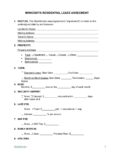- Lead-Based Paint Disclosure Form & EPA Pamphlet – Under The Minnesota Lead Poisoning Prevention Act, if property was built before 1978 then the lead-based paint disclosure must be give to Tenants along with the EPA pamphlet. [1]
- Radon Disclosure Form – Any known radon must be disclosed along with the records of mitigation and testing. [2]
- Foreclosure Notice – The Landlord must inform the Tenant if the rental property is in foreclosure and the lease cannot exceed two (2) months. [3]
- Landlord/Manager Contact Information – The lease must include the name and contact information of the Landlord or property manager. [4]
- Property Disclosure Statement – All material facts must be disclosed to the Tenants.
- Fee Disclosure – Rent and all required fees must be listed as “Total Monthly Rent” on the first page of the lease. [5]
- Move-in Inspection – Tenant must have the option to conduct a move-in inspection within 14-days if a security deposit is collected.
- Service/Support Animals – Landlords cannot charge extra fees or deposits for service or support animals. [6]
- Shared-Meter Utilities – If utilities are sub-metered, bills must be based on the actual usage readings. [7]
- Covenant of Unlawful Activities – The following must be included in the lease agreement: [8]
1.) Allow controlled substances in those premises or in the common area and curtilage of the premises in violation of any criminal provision of chapter 152;
2.) Allow prostitution or prostitution-related activity as defined in section 617.80, subdivision 4, to occur on the premises or in the common area and curtilage of the premises;
3.) Allow the unlawful use or possession of a firearm in violation of section 609.66, subdivision 1a, 609.67, or 624.713, on the premises or in the common area and curtilage of the premises; or
4.) Allow stolen property or property obtained by robbery in those premises or in the common area and curtilage of the premises; and
5.) The common area and curtilage of the premises will not be used by either the landlord or licensor or the tenant or licensee or others acting under the control of either to manufacture, sell, give away, barter, deliver, exchange, distribute, purchase, or possess a controlled substance in violation of any criminal provision of chapter 152. The covenant is not violated when a person other than the landlord or licensor or the tenant or licensee possesses or allows controlled substances in the premises, common area, or curtilage, unless the landlord or licensor or the tenant or licensee knew or had reason to know of that activity.









